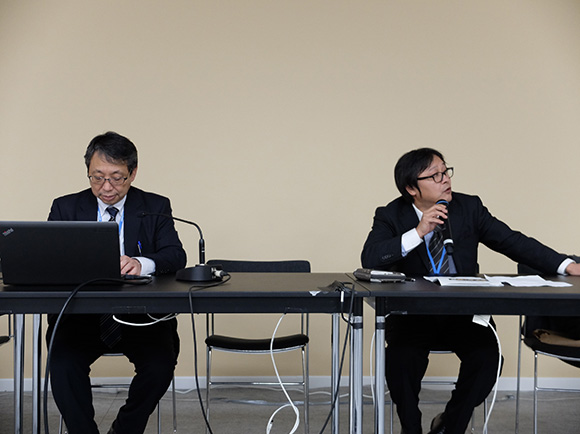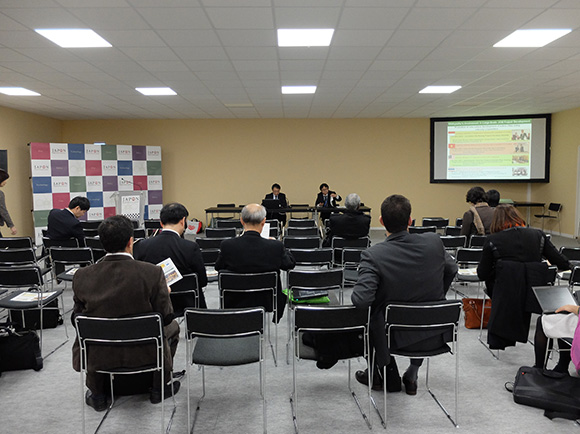Low Carbon City Building through “Intercity Cooperation Projects” Utilizing the JCM Support System – Case of the City of Kitakyushu
Kitakyushu Asian Center for Low Carbon Society, City of Kitakyushu; NTT DATA Institute of Management Consulting Inc.
Outline
The theme of our event is to provide the possibility for green growth and/or low carbon city establishment through “intercity cooperation projects” utilizing the JCM (Joint Crediting Mechanism) scheme. The City of Kitakyushu has 4 intercity cooperation projects – Surabaya, Indonesia; Hai Phong, Vietnam; Rayong, Thailand; and Iskandar, Malaysia. The City of Kitakyushu will provide the background, project contents and results through intercity cooperation activities. The features and the challenges to promote green growth and/or establishment of low carbon society in partner countries will be introduced, and future plans will be proposed in order to develop further cities.
Program
-
- Low-carbonization in Asian Cities through City to City Cooperation
- Kengo Ishida, Chief Executive, Environment Bureau, City of Kitakyushu
-
- Q&A
- Kengo Ishida, Chief Executive, Environment Bureau, City of Kitakyushu
Junichi Sono, Director, Kitakyushu Asian Center for Low Carbon Society, City of Kitakyushu
Summary
Mr. Ishida explained that the City of Kitakyushu, through the Kitakyushu Asian Center for Low Carbon Society established in 2010, has been supporting low-carbon development in Asian cities utilizng the Kitakyushu Model. The model is systematically arranged based on the knowledge and environmental technologies of Kitakyushu from its experience in overcoming pollution to its quest as an environmental city. The Model focuses on four areas: waste, energy, water and pollution mitigation.
Mr. Ishida also introduced that Kitakyushu City has been promoting “city-wide low-carbon development” through the JCM feasibility studies supported by the Ministry of the Environment, Japan. Surabaya (Indonesia), Hai Phong (Viet Nam), Pasigdan/Iskandar (Malayasia), and Rayong (Thailand) are the partner cities of the studies. In Surabaya, one identified project under the study to install high-efficiency air-conditioning system into a shopping mall was adopted as one of the financing program for JCM model projects in FY2015. In Hai Phong, the Green Growth Promotion Plan was developed with support of Kitakyushu under the JCM Feasibility Study scheme. The 2015 study investigated the introduction of highly-efficient electric furnaces that can contribute to energy saving and extension of the product lifecyle.
Mr. Ishida summarised the benefits of the city-to-city cooperation scheme as follows: (a) enabling introduction of better but higher cost low-carbon technologies to be carried out through the application of the JCM; (b) lowering administrative costs through private sector initiatives in public-private partnerships (PPP); (c) promoting co-benefits such as CO₂ reduction, pollution mitigation and improvement quality of life; and (d) high chance of long-term follow-up through intercity cooperation.
He concluded his presentation by expressing that the City of Kitakyushu will further contribute to low-carbon city development in Asia by developing models for “citywide low-carbon development” based on what are achieved such in Surabaya and Haiphong, and expanding the models to other cities in Asia.
In the Q&A session there were several questions. Responding to a question on Kitakyushu city’s activities in Africa, it was explained that the city provided support on solid waste management in Nairobi, Kenya.
Key Messages
City-to-city cooperation for low-carbon city development can promote and support projects for GHG emissions reduction based on mutual trust of two cities, which could result in “city-wide low-carbon development”. The City of Kitakyushu which is now promoting JCM city-to-city cooperation projects in four Asian cities will contribute to low-carbon development of the region by developing low-carbon development model in Asian cities and extending the models to other Asian cities.
Photograph
Reporters
Junichi Sono, Director, Kitakyushu Asian Center for Low Carbon Society, City of Kitakyushu








